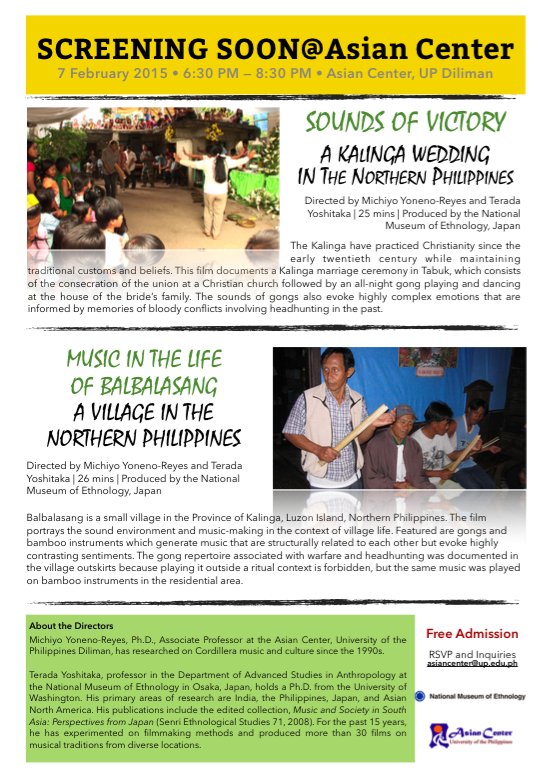 The Asian Center, in collaboration with the National Museum of Ethnology, Japan, will be screening two films on Kalinga music, society, and culture on Saturday, 7 February 2015, 6:30 p.m. to 8:30 p.m. at the Hall of Wisdom, GT-Toyota Asian Cultural Center, Asian Center, University of the Philippines Diliman. The screenings are free and open to the public.
The Asian Center, in collaboration with the National Museum of Ethnology, Japan, will be screening two films on Kalinga music, society, and culture on Saturday, 7 February 2015, 6:30 p.m. to 8:30 p.m. at the Hall of Wisdom, GT-Toyota Asian Cultural Center, Asian Center, University of the Philippines Diliman. The screenings are free and open to the public.
Sounds of Victory: A Kalinga Wedding in the Northern Philippines documents a Kalinga marriage ceremony, which consists of the consecration of the union at a Christian church followed by an all-night gong playing and dancing at the house of the bride’s family. The sounds of gongs generate highly complex emotions that are informed by memories of bloody conflicts involving headhunting in the past.
Music in the Life of Balbalasang Village in the Northern Philippines portrays the sound environment and music-making in the context of Kalinga village life. Particularly featured are two types of instruments (i.e. gongs and bamboo instruments) that generate music that are structurally related to each other and evoke highly contrasting sentiments. The gong repertoire associated with warfare and headhunting was documented in the outskirts of the village because playing it outside a ritual context is forbidden; the same music was played on bamboo instruments in a residential area.
After the screening, the directors will speak about the films and solicit questions and feedback from the audience. Interested participants may send their inquiries or confirm their attendance at This email address is being protected from spambots. You need JavaScript enabled to view it., but please note that seats are available on a first-come, first-served basis.
The two films will also be screened at TALA Guest House in Baguio City on 4 February 2015 and at the University of the Philippines Baguio on 5 February 2015. Produced by the National Museum of Ethnology, Japan, both films are directed by Michiyo Yoneno-Reyes, Ph.D. and Terada Yoshitaka, Ph.D.
Dr. Yoneno-Reyes is an associate professor at the Asian Center, University of the Philippines Diliman. She has been researching on the music and culture of the Cordillera since the 1990s. At present, she is preparing a book manuscript on the social and historical aspects of “salidummay” songs in the northern Philippine highlands.
Terada Yoshitaka, professor in the Department of Advanced Studies in Anthropology at the National Museum of Ethnology in Osaka, Japan, holds a Ph.D. from the University of Washington. His primary areas of research are India, the Philippines, Japan, and Asian North America. His publications include the edited collection, Music and Society in South Asia: Perspectives from Japan (Senri Ethnological Studies 71, 2008). For the past 15 years, he has experimented on filmmaking methods and produced more than 30 films on musical traditions from diverse locations.
The Asian Center offers MA degrees in Asian and in Philippine Studies. The Asian Studies program offers specializations in Northeast Asian Studies, Southeast Asian Studies, South Asian Studies, or West Asian Studies. The Center also has an M.A. program in Philippine Studies that allow students to specialize on Philippine society and culture, Philippine foreign relations, or Philippine development studies. The Center also offers a Ph.D. program in Philippine Studies in conjunction with the College of Arts and Letters and the College of Social Sciences and Philosophy. Like the Asian Center on Facebook and follow us on Twitter @upasiancenter.

